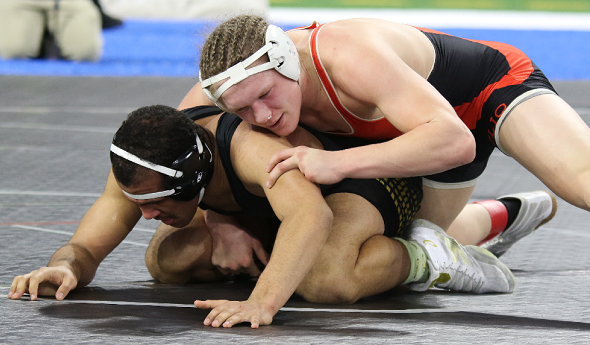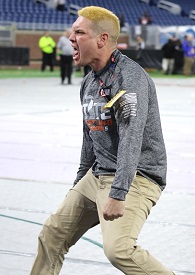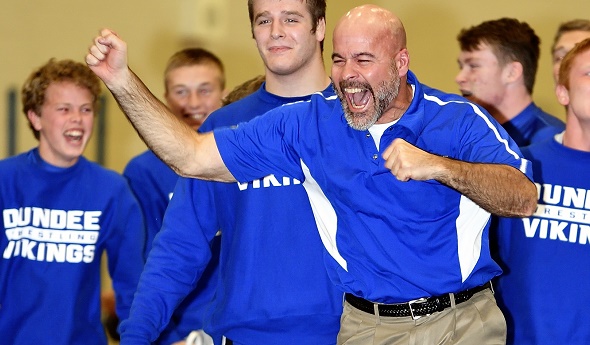
Vance Bounces Back to Finish as Champ
By
Paul Costanzo
Special for MHSAA.com
March 10, 2020
It took a day for Tristan Vance to fully appreciate what he had accomplished.
 The Clio senior won the Division 2 189-pound championship Saturday at the MHSAA Individual Wrestling Finals. Quite often, it takes some time before the gravity of the moment sets in. For Vance, that was partially true. But mostly, he was too sore to celebrate in a big way.
The Clio senior won the Division 2 189-pound championship Saturday at the MHSAA Individual Wrestling Finals. Quite often, it takes some time before the gravity of the moment sets in. For Vance, that was partially true. But mostly, he was too sore to celebrate in a big way.
“That night, I was happy about it and celebrating about it, but I was so sore,” Vance said. “My back started spasming up right after the match. I was just so sore. I wanted to get home, and I wanted to rest. The next day, I was ecstatic.”
The spasms were nothing new to Vance, but rather a painful reminder of what he had to endure to get to this point. He missed more than half of the season because of them and didn’t return to the mat until the postseason.
While Vance himself wasn’t showing the elation and emotion that comes with overcoming what he did, his coach and father, Tony, certainly was understanding of the achievement.
“All I wanted to do is find my wife in the stands and give her a hug and kiss,” Tony Vance said. “It was the best feeling I think I’ve had since my kids were born. I got excited, and I kind of walked to the middle of the mat looking for her. I didn’t know where she was at, then I saw her waving to me. I climbed the wall and gave her a hug. It was such a struggle for him, and so much for us, too.”
The pain started late in the summer for Tristan, but it stemmed from a surgery he had as a 12-year-old. Back then, he was having back pain that effected the way he was walking. After consulting with multiple doctors, a benign tumor was found on his spine.
“I thought I had cancer, and I thought I was going to die – for like 10 minutes,” he said. “Until my mom was like, ‘That’s not what it is.’ After that, I’ve always been kind of chill, not too worried about things.”
The surgery to remove the tumor was successful, but that wasn’t the end of Tristan’s problems. He said he suffered from nerve damage and sciatica. His muscles were still tight, and he had to undergo rehabilitation for his left hamstring.
Eventually, he improved and blossomed into a star athlete at Clio, playing quarterback and linebacker on the football team and earning all-state honors (eighth place) on the wrestling mat as a junior.
That’s what made things even harder when the back pain returned.
“In middle school, none of that mattered to me,” Tristan said. “This year, it really kind of hit a soft spot. I was really depressed about it. I was kind of sure that I wasn’t going to be able to do anything.”
Tristan thought he had another tumor, but that was quickly ruled out. He was told that the smaller muscles around the hole where the tumor used to be were weakened and never fully recovered. The bigger muscles in his back were overcompensating, causing the spasms.
He decided, however, to play quarterback through the football season, even though he ran the ball a lot in Clio’s read-option offense.
“It got so bad where he couldn’t even run sometimes in games,” Tony Vance said. “He would play until he couldn’t play anymore.”
The motivation for Tristan was to play his final season with his friends on the football team. He did admit, though, that if he felt his wrestling season was truly threatened, he may have stopped.
When wrestling season began, the thought was to take things slow. Tristan returned to the mat in January, but his back acted up again in the New Lothrop tournament, and he was once again forced to sit.
“When I had to stop wrestling, it wasn’t because of the pain. It was because my muscles would contract and spasm, and I wasn’t able to do it physically,” he said. “It hurt my feelings. I was like, I don’t know if I’m going to be able to finish the season. I had four other guys on the team that ended up going to the state tournament with me, and I was seeing them do well and I was happy to see that, but I wanted to be part of that so bad.”
 Tristan helped his teammates in the practice room, though he wasn’t sure if he would be able to compete again. As the postseason drew near, he began working out more and preparing for the possibility. The decision was made to put him into the lineup during the Team District and see how he held up.
Tristan helped his teammates in the practice room, though he wasn’t sure if he would be able to compete again. As the postseason drew near, he began working out more and preparing for the possibility. The decision was made to put him into the lineup during the Team District and see how he held up.
“We ended up holding him out as long as we could,” Tony Vance said. “He wrestled (in the Team District) and felt pretty good, so I said, ‘All right, we’ll wrestle you in (Individual) Districts. I was worried, because I didn’t want to have another kid have to sit out, then take him all the way up to Gaylord and enter him into Districts and him not be able to wrestle.”
Tristan entered the District with a 10-2 record. He also entered at 189, despite having wrestled at 171 earlier in the season. He weighed around 180 pounds, and Tony Vance didn’t think adding a large weight cut to the stress already on Tristan’s body was a good idea. The bump didn’t bother Tristan, who was second in the District and first at the Regional.
He entered the Individual Finals as the No. 2 seed. But thanks to having wrestled so few matches, and the presence of undefeated Central Michigan recruit John Shelton of East Grand Rapids on the other half of the bracket, Tristan came in under the radar.
“I had a problem with that last season, where I kind of got in my head a little bit and too full of myself, which really affected me,” he said. “Coming in as an underdog – it wasn’t the most fun way for my last season to be, but it really helped with my mentality coming into the tournament.”
Tristan won handily in his first two matches before running into Fruitport’s Crue Cooper in the semifinals. Cooper was considered by many to be Shelton’s main competition heading into the Finals, but Tristan came away with the 3-1 overtime victory.
“I really wasn’t getting too excited about anything, to be honest,” Tony Vance said of his mindset coming into the tournament. “Me and my wife were just happy that he was able to wrestle again. He won a huge match in the semis. As the match was going, I was like, ‘Man. OK, he’s really looking good.’ After that match was done, I was excited. I thought, whatever happens from here, he’s made a good run. I wasn’t thinking that he was going to win it, I was just thinking that we’d see where it goes (Saturday), and I’ll be able to tell how he’s doing at the end of the first period.”
Tristan was calm as he entered his match against Shelton, even after he was informed right beforehand of Shelton’s credentials.
“I have never wrestled him before, and I have never seen him wrestle before because he’s on the west side of the state,” Tristan said. “My plan was mostly just to get to my tie-ups, get to my offense and do what I do best instead of waiting on what he can do.”
The match was tied at 3 after one period, and Tristan was able to take a 4-3 lead with an escape in the second. In the third period, Shelton chose down, and Tristan built an 8-4 lead thanks to a nearfall and a takedown. An escape and a stalling point put Shelton out of striking distance again, and he threw Tristan in a headlock as the clock was winding down. Tristan was able to get to his stomach, though, preventing the takedown or any back points.
“He has ice in his veins,” Tony Vance said. “He doesn’t have any doubt in himself, but he doesn’t show any emotion. He’s just calm and cool.”
After what could be his final competitive match – Tristan said he’s undecided about his future – he was congratulated by a host of spectators just off the mat, including his teammates and coaches from other schools.
Excited but sore, Tristan calmly walked through it all, not yet fully cognizant of the degree of his remarkable achievement.
“I had a lot of emotions through that time, and I wasn’t really thinking about (going through the injury) too much,” Tristan said. “I was just thinking about what had just happened. Now I’ve realized that I kind of accomplished a lot given my circumstances this year.”
 Paul Costanzo served as a sportswriter at The Port Huron Times Herald from 2006-15, including three years as lead sportswriter, and prior to that as sports editor at the Hillsdale Daily News from 2005-06. He can be reached at [email protected] with story ideas for Genesee, Lapeer, St. Clair, Sanilac, Huron, Tuscola, Saginaw, Bay, Arenac, Midland and Gladwin counties.
Paul Costanzo served as a sportswriter at The Port Huron Times Herald from 2006-15, including three years as lead sportswriter, and prior to that as sports editor at the Hillsdale Daily News from 2005-06. He can be reached at [email protected] with story ideas for Genesee, Lapeer, St. Clair, Sanilac, Huron, Tuscola, Saginaw, Bay, Arenac, Midland and Gladwin counties.
PHOTOS: (Top) Clio’s Tristan Vance works to maintain control in his opening match of the Division 2 Individual Finals against Lansing Waverly’s Demitrius Webb. (Middle) Clio coach – and Tristan’s father – Tony Vance celebrates as Tristan finishes a semifinal win over Fruitport’s Crue Cooper. (Click for more from HighSchoolSportsScene.com.)

Roberts Drives Dundee to Chase Dream
January 8, 2019
By Doug Donnelly
Special for Second Half
DUNDEE – The thing that keeps Dundee wrestling coach Tim Roberts motivated isn’t another dual meet victory, matching up with state powerhouse Hudson in a conference meet or hanging another banner inside the Vikings’ gymnasium.
 Those things are nice, but what keeps Roberts going in his 20th season as the Dundee head coach is a certain two-time MHSAA Finals-qualifying wrestler from the mid-1980s who won 120 matches for Dundee but ultimately fell short of his goals.
Those things are nice, but what keeps Roberts going in his 20th season as the Dundee head coach is a certain two-time MHSAA Finals-qualifying wrestler from the mid-1980s who won 120 matches for Dundee but ultimately fell short of his goals.
That wrestler was Roberts.
“I’m always trying to prove myself, and I’m always trying to get better,” Roberts said. “When I think of myself as that kid who didn’t place at state, I do much better because I keep that hunger and desire. I need to learn more. I’ve got to get better at this.”
Roberts is already pretty good at what he does – a hall of famer, says Hudson coach Scott Marry, a seven-time MHSAA championship-winning coach himself.
“Coach Roberts is one of the best coaches I’ve ever coached against,” Marry said. “He gets his kids ready mentally and physically. You better have your team ready if you’re going to wrestle Dundee.”
Earlier this season, Roberts reached a career milestone – 500 career wins. He’s led Dundee to six Finals titles and six runner-up finishes, 19 District and 18 Regional titles. He’s coached 32 Individual Finals championship wrestlers and more than 140 all-staters. Under his leadership, Dundee also is approaching 20 Lenawee County Athletic Association titles.
The numbers don’t tell the full story about Roberts, however.
“I could write a book about Tim and how great a coach he is,” said Dundee athletic director Tom Oestrike. “His coaching profile speaks for itself, but what is even more impressive are the type of young men he has helped build in his career – men of selflessness, character and discipline.”
When Roberts wrestled at Dundee, he was a 98-pound freshman who grew to compete in the 126-pound weight class as a senior.
“We were a solid program at the time, (but) winning state was an impossible dream back then for sure,” Roberts said.
“I wasn’t bad at wrestling. I was pretty good. Compared to the guys we have now – I wasn’t as good as them. I thought I was pretty good, but I didn’t accomplish the goals that I wanted to.”
After high school, he enlisted in the Army. It was during that time that he got the coaching bug. He realized he wanted to help young student athletes learn how to get the most out of their careers.
“When I was in the military, I learned a lot about building myself into something and I wanted to share that information,” he said. “I thought about wrestling a lot and how I really didn’t accomplish the goals that I would have liked to, and I wanted to help other people. I had this desire to try to help. I felt like I had a knack for it.”
After his first year as an assistant coach, Dundee changed wrestling head coaches and Jim Wittibslager got the job. Roberts asked him if he could stay on as an assistant.
Wittibslager is a hall of fame coach in his own right. He compiled a record of 333-36-3 in two stints as the Dundee head coach. The Vikings won four straight MHSAA Finals titles during his tenure, from 1995-98.
“We went from a team 4-21 with zero state qualifiers, and by the fifth year we were state champs with 14 state qualifiers,” Roberts said. “It was quite a building process. It was lot of fun to go through and learn. Winning state went from an impossible dream to something that ‘Oh yeah, we could do this.’ We built ourselves into that level.”
Coaching with Wittibslager was a career-changer for Roberts.
“That was crucial in my development in how to coach,” he said. “I thought I had a knack for helping people and I had a little talent in that area, but I learned so much about what it takes, the work ethic and how to win and how to think like a winner.”
Admittedly, Roberts isn’t the same coach he was two decades ago. The sport has evolved significantly.
“I don’t coach now like I did 20 years ago, I’ll say that,” he said. “You grow with the times or you get left behind.”
What hasn’t changed during that time is Roberts’ attention to detail, his passion for coaching the right technique and getting his team ready for meets. Practices now include time in the weight room, warming up with some gymnastics moves such as back handstands, leaps and cartwheels; and, of course, technique.
“We still do conditioning,” he said. “We do quite a bit of that.”
Roberts believes one thing that sets wrestlers apart from each other is how far they can push themselves on the mat – when they reach the point where they feel they don’t have any more strength or ability, they find it.
“The only way you know if you can (push yourself) is by getting (to that point). That, as much as anything, will win you matches,” he said.
Maintaining that success has never been easy. Dundee typically has about 20 wrestlers out each year, a comparably low number to some other high-level programs. But that is where Roberts does his best work. Coaching at the high school level, he said, isn’t about coaching extraordinary athletes – it’s about coaching the average ones.
“It’s been an endless process for 20 years to keep trying to get better at this,” he said. “Average people are who you are coaching. That’s what coaching high school is, I think, learning how to work with the average person. Then, once in a while, you get to work with the exceptional person and that’s fun.”
Despite the enormous success during his 20 seasons at Dundee, Roberts has experienced the same highs and lows as any other coach.
“Lots of highs and lows,” he said. “Lots of times of feeling great, then you get humbled. Then you start feeling great again and then humbled again.”
Roberts coached Dundee to a Division 4 championship in 2001 and Division 3 titles in 2007, 2013, 2014, 2016 and 2018. Last year’s team was ranked nationally and had 14 Individual Finals qualifiers.
“Every one of those (championships) is like the best day of my life,” Roberts said. “Every time. It’s such a great feeling in the end that it all came together, and everything did work, and you did get it all done. A lot of things have to go right. It’s not easy.”
Roberts, 50, isn’t planning on stepping away from coaching any time soon. He’s also not stopping to think about reaching 500 career wins any time soon. He’d rather think about that high school wrestler who missed out on winning a state championship – but has had a remarkable impact on so many others.
“That’s for when you are done (coaching),” he said. “Right now, I’m still trying to get better and trying to work on my weaknesses as a coach and always seeking out how I can be better at this. When you’re done is when you get to reflect.”
 Doug Donnelly has served as a sports and news reporter and city editor over 25 years, writing for the Daily Chief-Union in Upper Sandusky, Ohio from 1992-1995, the Monroe Evening News from 1995-2012 and the Adrian Daily Telegram since 2013. He's also written a book on high school basketball in Monroe County and compiles record books for various schools in southeast Michigan. E-mail him at [email protected] with story ideas for Jackson, Washtenaw, Hillsdale, Lenawee and Monroe counties.
Doug Donnelly has served as a sports and news reporter and city editor over 25 years, writing for the Daily Chief-Union in Upper Sandusky, Ohio from 1992-1995, the Monroe Evening News from 1995-2012 and the Adrian Daily Telegram since 2013. He's also written a book on high school basketball in Monroe County and compiles record books for various schools in southeast Michigan. E-mail him at [email protected] with story ideas for Jackson, Washtenaw, Hillsdale, Lenawee and Monroe counties.
PHOTO: Dundee wrestling coach Tim Roberts and his team celebrate one of the many successful moments during his two decades leading the program. (Photo by David Schankin.)

